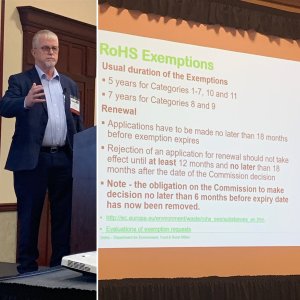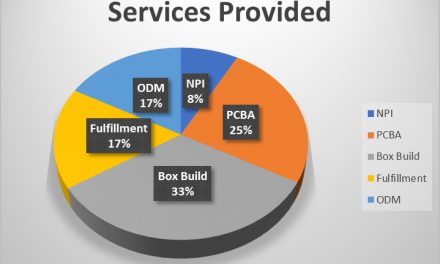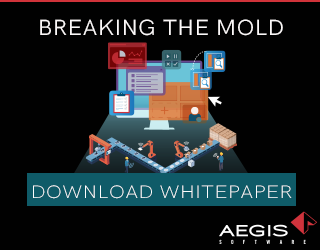What Every Electronics Company Needs to Know about Environmental Product Requirements

By Kelly Scanlon, IPC Director of Environment, Health and Safety Policy and Research
The task of monitoring and complying with environmental, health and safety (EHS) rules that affect electronics companies and their products requires a watchful eye on all levels of government: local, state, national, and international. EHS policies typically carry significant penalties for non-compliance but great rewards for high performance and proactive leadership.
To help our members navigate this landscape, IPC recently partnered with the Information Technology Industry Council (ITI) to offer three, day-long educational conferences in Massachusetts, Illinois, and California on “Critical and Emerging Environmental Product Requirements.”
The policies covered were an alphabet soup of those affecting chemicals, waste management, and enforcement, including:
• EU REACH (Registration, Evaluation, Authorization and Restriction of Chemicals Regulation);
• RoHS (Directive on the restriction of the use of certain hazardous substances in electrical and electronic equipment)
• WEEE (Waste Electrical and Electronic Equipment Directive);
• The Circular Economy action plan;
• Regulations affecting batteries; and
• California’s Proposition 65, officially known as the Safe Drinking Water and Toxic Enforcement Act of 1986, administered by the state Office of Environmental Health Hazard Assessment (OEHHA).
Across the three conference locations, 120 attendees heard from industry-leading experts from ITI, Oracle, the U.K. Department for Business, Energy, and Industrial Strategy (BEIS), and the European Commission’s Directorate General for Environment.
Attendees also had the chance to engage with colleagues from the event sponsors, including Assent Compliance, Compliance Map, Compliance & Risks, GreenSoft Technology, IHS Markit, iPoint, SiliconExpert, and Total Parts Plus.
Two major takeaways emerged:

How can you ensure you’re complying with the RoHS Directive? Paul Tennant, BEIS, educates attendees at the IPC and ITI Emerging & Critical Environmental Product Requirements Conference.
• All jurisdictions need to work towards harmonized and simplified environmental regulations and the enforcement of those regulations, with a “stretch” goal of a globally harmonized approach to the life cycle management of chemicals and products, no matter what country, region, or state is involved.
• Industry leaders need to make proactive engagement with policy makers a routine and positive part of business; and in turn this cooperation and collaboration will promote good business and the protection of human health and the environment.
Giuseppina Luvarà, a policy officer with the Sustainable Chemicals Unit of the European DG for Environment, briefed attendees on the second REACH review, which was completed in 2018; as well as current efforts to harmonize REACH and RoHS implementation and enforcement across the EU. Luvarà highlighted new efforts to develop comprehensive frameworks on endocrine disruptors and the cumulative effects of chemicals.
Paul Tennant, an enforcement manager from the Office for Product Safety and Standards within the U.K. Department for Business, Energy, and Industrial Strategy (BEIS), described how EU Member States are working together to address common compliance challenges for the RoHS and WEEE regulations. Tennant stressed the need for ongoing communications among Member States and between regulators and companies, with an emphasis on early consultations and dialogues.
Carl Magness, an enforcement team leader with BEIS, provided examples of how that office helps companies achieve compliance with RoHS, WEEE, and Batteries and Accumulators (Placing on the Market) regulations. He used examples of recent enforcement efforts to demonstrate how collaboration with regulators enabled the development of champions. Instead of compliance notices or prosecutions, the BEIS team favors business improvement plans to remedy problems and promote sustainable business practices.
Alexa Lee, Senior Manager for Policy from ITI, and Jennifer McLaughlin, Program Manager for Product Environmental Compliance from Oracle, highlighted changes in the RoHS, WEEE, and plastic waste management regulatory requirements and how they apply to companies who manufacture or place EEE on the market in China, Hong Kong, India, and Bangladesh. Varying equipment labels, reporting requirements, product categories, and concentration or threshold-volume “triggers” are creating an uneven and challenging landscape for companies to navigate.
Chris Cleet, Senior Director for Policy, Environment and Sustainability at ITI, took us on a tour of California’s unique requirements, specifically Proposition 65 and the Green Chemistry Initiative. He reviewed changes to Prop 65 warning labels and the increased issuance of Safe Use Determinations by OEHHA. In addition, Cleet reviewed several ecolabel and design standards that are intended to spur attention to potential life cycle impacts from EEE products, recognizing that consumer choices often drive change as much or more than regulations do.
It is the responsibility of every company to understand the EHS regulations that apply to them, but IPC will continue to be your educational resource and your advocate. To learn more about IPC’s EHS policy and research work, please e-mail me at KellyScanlon@ipc.org and/or subscribe to our weekly e-newsletter.












